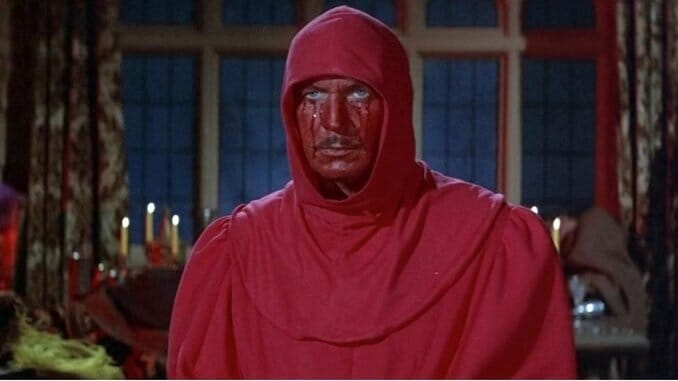Revisiting Roger Corman’s The Masque of the Red Death
And wishing Prospero and his guests a speedy recovery, of course.

But Prince Prospero was happy and dauntless and sagacious. When his dominions were half depopulated, he summoned to his presence a thousand hale and light-hearted friends from among the knights and dames of his court, and with these retired to the deep seclusion of one of his crenellated abbeys. This was an extensive and magnificent structure, the creation of the prince’s own eccentric yet august taste. A strong and lofty wall girdled it in. This wall had gates of iron. The courtiers, having entered, brought furnaces and massy hammers and welded the bolts.
“Consequence” is a word that’s been on the mind of many since 2016, when a dubious electoral process determined that a man with decades of credible sexual assault allegations against him, who openly called for election tampering, mocked the disabled—and any number of other things I’m too tired to remember at this point—should be the next head of state. In the intervening years, he has provably and repeatedly lied while in office, abused his position, funneled money to his own properties and family, insulted allies, and violated the trust of those who look to American good will at home and abroad. His supporters simply shrug and keep supporting him, even as he cheerily swings a wrecking ball into constructs and norms they’ve long held sacred. And even now, nearly a year into the worst and deadliest mismanagement of a crisis in the entire history of the country, there isn’t so much as a whisper of removing from power the incompetent charlatans who got us here.
We should be a society of laws, not men, they say. But who’s carrying out the laws? Faced with the triumph of cruelty and avarice, with the powerlessness of the innocent and the impunity of the wicked, you can understand the twisted mindset of Vincent Price’s Prospero in Roger Corman’s 1964 adaptation of Edgar Allan Poe’s “The Masque of the Red Death,” a story he wrote in 1842. If a beast like Prospero can caper about unchecked, it’s certainly proof that a higher power is asleep at the wheel, or that the true ruler of the cosmos believes our suffering to be the rightful order.
It’s a convenient worldview for a guy with a castle, an army and a shitload of money to have.

His plans were bold and fiery, and his conceptions glowed with barbaric lustre. There are some who would have thought him mad. His followers felt that he was not. It was necessary to hear and see and touch him to be sure he was not.
You can finish reading Poe’s story inside of two minutes, just long enough to paint a picture of Prospero’s decadence and hubris and then see it shattered. Any adaptation of feature length needs to make distinct choices. Corman’s invests Prospero (Price) with loud and proud Satanism, and contrasts him against two young peasants, the lovers Gino and Francesca (David Weston and Jane Asher). As the film begins, Prospero rolls into their small town as winter is about to set in to extract his usual levies. When met with defiance, he kidnaps Gino and Francesca, but not before finding another peasant stricken by the Red Death.
Prospero has already booked the venue for his harvest masquerade ball, though, so he barricades himself into his high-walled castle with only two rules: Nobody gets in or out, and nobody wears red. The film builds up to the final ball by exploring Prospero’s avowed evil as he monologues to Francesca and tries to corrupt both her and Gino. Look at the want and misery in the world, he says, and explain how God can be the true power in the universe. Surely, he argues, it must instead be Satan.
Prospero stays atop his perch because the other nobles allow it, soaking up his backhanded praise and open disdain with dopey smiles. He orders his guests to act like lowly animals for his amusement, scoffs with distaste when one of them dies by fire in the midst of the revelry, and literally showers them with riches while insulting them for their naked greed. He has no friends, only sycophants. He has no lovers, only victims. When a group of villagers without shelter beg for help, he has them killed.

There were many individuals in the crowd who had found leisure to become aware of the presence of a masked figure which had arrested the attention of no single individual before. And the rumor of this new presence having spread itself whisperingly around, there arose at length from the whole company a buzz, or murmur, of horror, and of disgust.
